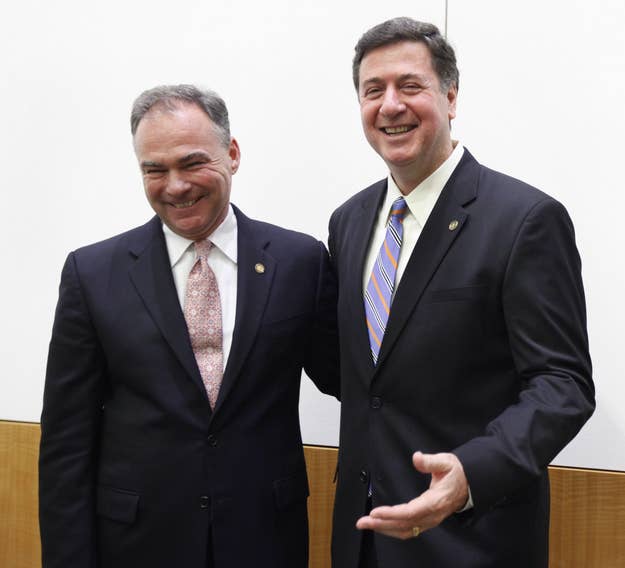
BLACKSBURG, Va. — For a race many had thought would be an arena for political blood sport, Virginia’s senate campaign has been largely a humdrum affair.
Take Thursday night’s fifth, and final debate between former Gov. Tim Kaine and former Sen. George Allen. Neither candidate threw a knock out punch or made a major gaffe, and despite a few brief back and forth, the hour-long affair was almost completely devoid of the sort of sniping and personal back and forth that have marked other debates — for President and for Senate — this year.
Unlike Senate races in Missouri and Arizona, neither of which were seen as marquis fights when the cycle began two years ago, Virginia’s battle for retiring Sen. Jim Webb’s seat has been largely devoid of fireworks, and Thursday’s debate on the campus of Virginia Tech was no different.
Instead, Kaine and Allen stayed focused largely on who would be more bipartisan in Washington and issues like the looming $500 billion cut to defense spending which has become a major talking point in a state with hundreds of thousands of military and defense industry jobs.
“I don’t really think there’s an ‘our side’ or ‘their side.’ We’re all Americans. We’re all Virginians,” Kaine said at one point, pledging to join a bipartisan group of Senators pushing for a new compromise on the fiscal cliff.
“There’s a new gang in the Senate, the Gang of Six … I have pledged to join the gang,” Kaine said.
“We need more people can build bridges,” Kaine added.
Allen made a similar pitch, touting his work with a Democratically-controlled legislature during his time as Governor while distancing himself from his partisan past.
“I’m going to be a senator for the people of Virginia,” Allen said when asked about his partisan reputation earned during his six years in the Senate.
Seeking to tie Kaine directly to Obama, Allen repeatedly pointed to issues like Obamacare, the failed effort to pass climate change legislation as areas where Kaine has backed unpopular Obama priorities, and charged Kaine would use the defense cuts as a “bargaining chip” to force the GOP to swallow an end to the Bush-era tax cuts for upper income earners.
After several swipes from Allen, Kaine briefly flashed his anger, saying, “I have a son who just started a career in the military. I’m not going to do things that hurts the military or hurts defense.”
Allen and Kaine also sparred over last month’s attack on the U.S. consulate in Libya, which left ambassador Chris Stevens and several other Americans dead — a clear sign of the issue’s potency in this year’s election cycle.
“The incident in Libya was a very, very troubling one … And we need to get to the bottom of it,” Kaine said, arguing that Congress and the White House should work together to strengthen security and use as a model how Virginia Tech and state responded to the 2007 massacre that left 32 people dead.
“We need to take the same model in respect to the attack in Libya,” Kaine said.
But even on Libya, Kaine took a partisan shot at Allen, pointing to the fact that Rep. Paul Ryan’s budget included reductions in embassy security spending.
“I don’t think reducing spending on embassy security is a good idea,” Kaine said.
Allen also expressed concern with the attack and argued it is part of a broader failure of the Obama administration’s foreign policies, noting that the administration is sending millions in aid to the Egyptian government, despite violent, though not bloody, attacks on our embassy there.
“I don’t think that money ought to be sent to Egypt until they prove they’re going to work with us,” Allen said.
But even the issue of Libya eventually ended up back on the topic of the Congressional plan to impose automatic cuts on defense spending, known as the sequester.
The attack shows “why the sequestration deal is not only wrong but its dangerous,” Allen said.
